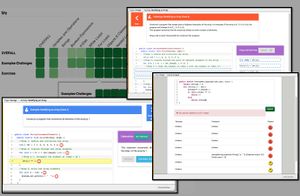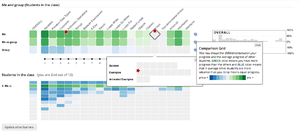Difference between revisions of "Looking For Collaborators"
From PAWS Lab
R.hosseini (talk | contribs) (→More about Open Social Learner Model Interface: Mastery Grids) |
R.hosseini (talk | contribs) |
||
| (4 intermediate revisions by the same user not shown) | |||
| Line 1: | Line 1: | ||
| − | We are looking for collaborators who are interested in using PCLab in introductory Java/Python programming classes. PCLab is designed to help students to construct | + | We are looking for collaborators who are interested in using PCLab in introductory Java/Python programming classes. PCLab is designed to help students to construct programs. It consists of programming examples and coding exercises for different topics in the introductory programming course. |
== Videos == | == Videos == | ||
| Line 9: | Line 9: | ||
|} | |} | ||
| − | == | + | == Mastery Grids Interface == |
{| | {| | ||
|valign="top" | [[Image:Mg_1.png|thumb|left|'''100'''|Mastery Grids Interface]] | |valign="top" | [[Image:Mg_1.png|thumb|left|'''100'''|Mastery Grids Interface]] | ||
| − | |valign="top" | PCLab presents examples and problems using Mastery Grids interface. Mastery Grids is both an innovative Open Social Learner Model Interface and an adaptive E-learning platform with integrated functionalities enabling multi-facet social comparison, open learner modeling, and adaptive navigation support to access multiple kinds of smart learning content. Mastery Grids is supported by adaptive social learning framework [[Aggregate]]. This framework supports several kinds of open student modeling, social comparison, and recommendation. In detail, Mastery Grids presents and compares user learning progress and knowledge level using colored grids, tracks user activities with learning content, and provides flexible user-centered navigation across different content levels (e.g. topic, question) and different content types (e.g. problem, example). Our past research shows that open student modeling and social comparison effectively increases students’ performance, motivation, engagement and retention. | + | |valign="top" | PCLab presents examples and problems using Mastery Grids interface. Mastery Grids is both an innovative Open Social Learner Model Interface and an adaptive E-learning platform with integrated functionalities enabling multi-facet social comparison, open learner modeling, and adaptive navigation support to access multiple kinds of smart learning content. Mastery Grids is supported by adaptive social learning framework [[Aggregate]]. This framework supports several kinds of open student modeling, social comparison, and recommendation. In detail, Mastery Grids presents and compares user learning progress and knowledge level using colored grids, tracks user activities with learning content, and provides flexible user-centered navigation across different content levels (e.g. topic, question) and different content types (e.g. problem, example). Our past research shows that open student modeling and social comparison effectively increases students’ performance, motivation, engagement, and retention. |
* [[Mastery Grids Interface|More about Mastery Grids interface]] | * [[Mastery Grids Interface|More about Mastery Grids interface]] | ||
| Line 19: | Line 19: | ||
|} | |} | ||
| − | ==Publications== | + | == Selected Publications == |
| + | The following papers present sample of studies that we conducted using Mastery Grids in different programming classes. | ||
| + | |||
* Loboda, T., Guerra, J., Hosseini, R., and Brusilovsky, P. (2014) Mastery Grids: An Open Source Social Educational Progress Visualization. In: S. de Freitas, C. Rensing, P. J. Muñoz Merino and T. Ley (eds.) Proceedings of 9th European Conference on Technology Enhanced Learning (EC-TEL 2014), Graz, Austria, September 16-19, 2014 (Best paper award). ([http://link.springer.com/chapter/10.1007%2F978-3-319-11200-8_18#page-1 paper]) ([http://www.slideshare.net/pbrusilovsky/ectel2014-mg presentation]) | * Loboda, T., Guerra, J., Hosseini, R., and Brusilovsky, P. (2014) Mastery Grids: An Open Source Social Educational Progress Visualization. In: S. de Freitas, C. Rensing, P. J. Muñoz Merino and T. Ley (eds.) Proceedings of 9th European Conference on Technology Enhanced Learning (EC-TEL 2014), Graz, Austria, September 16-19, 2014 (Best paper award). ([http://link.springer.com/chapter/10.1007%2F978-3-319-11200-8_18#page-1 paper]) ([http://www.slideshare.net/pbrusilovsky/ectel2014-mg presentation]) | ||
Latest revision as of 02:06, 14 December 2017
We are looking for collaborators who are interested in using PCLab in introductory Java/Python programming classes. PCLab is designed to help students to construct programs. It consists of programming examples and coding exercises for different topics in the introductory programming course.
Videos
| The following videos introduce PCLab for Java/Python programming. |
Mastery Grids Interface
| PCLab presents examples and problems using Mastery Grids interface. Mastery Grids is both an innovative Open Social Learner Model Interface and an adaptive E-learning platform with integrated functionalities enabling multi-facet social comparison, open learner modeling, and adaptive navigation support to access multiple kinds of smart learning content. Mastery Grids is supported by adaptive social learning framework Aggregate. This framework supports several kinds of open student modeling, social comparison, and recommendation. In detail, Mastery Grids presents and compares user learning progress and knowledge level using colored grids, tracks user activities with learning content, and provides flexible user-centered navigation across different content levels (e.g. topic, question) and different content types (e.g. problem, example). Our past research shows that open student modeling and social comparison effectively increases students’ performance, motivation, engagement, and retention. |
Selected Publications
The following papers present sample of studies that we conducted using Mastery Grids in different programming classes.
- Loboda, T., Guerra, J., Hosseini, R., and Brusilovsky, P. (2014) Mastery Grids: An Open Source Social Educational Progress Visualization. In: S. de Freitas, C. Rensing, P. J. Muñoz Merino and T. Ley (eds.) Proceedings of 9th European Conference on Technology Enhanced Learning (EC-TEL 2014), Graz, Austria, September 16-19, 2014 (Best paper award). (paper) (presentation)
- Brusilovsky, P., Somyurek, S., Guerra, J., Hosseini, R., and Zadorozhny, V. (2015) The Value of Social: Comparing Open Student Modeling and Open Social Student Modeling. In: F. Ricci, K. Bontcheva, O. Conlan and S. Lawless (eds.) Proceedings of 23nd Conference on User Modeling, Adaptation and Personalization (UMAP 2015), Dublin, Ireland, , June 29 - July 3, 2015, Springer Verlag, pp. 44-55 (paper presentation)
- Hosseini, R., Hsiao, I.-H., Guerra, J., Brusilovsky, P. (2015) What Should I Do Next? Adaptive Sequencing in the Context of Open Social Student Modeling. Proceedings of 10th European Conference on Technology Enhanced Learning (EC-TEL 2015), Toledo, Spain, September 15-18, 2015, pp. 155-168. (paper)(presentation).
- Hosseini, R., Sirkiä, T., Guerra, J., Brusilovsky, P., Malmi, L. (2016) Animated Examples as Practice Content in a Java Programming Course. Proceedings of the 47th ACM technical symposium on Computer Science Education (SIGCSE), Memphis, Tennessee, March 2-5, 2016. (paper) (presentation)
- Guerra, J., Hosseini, R., Somyurek, S., and Brusilovsky, P. (2016) An Intelligent Interface for Learning Content: Combining an Open Learner Model and Social Comparison to Support Self-Regulated Learning and Engagement. In: Proceedings of Proceedings of the 21st International Conference on Intelligent User Interfaces (IUI '16), Sonoma, California, USA, ACM, pp. 152-163. (paper) (presentation)
- Brusilovsky, P., Somyurek, S., Guerra, J., Hosseini, R., Zadorozhny, V., and Durlach, P. (2016) The Value of Social: Comparing Open Student Modeling and Open Social Student Modeling. IEEE Transactions on Emerging Topics in Computing 4 (3), 450-461. (paper)


